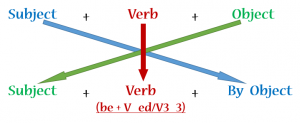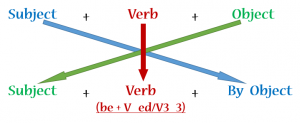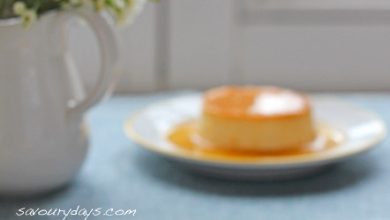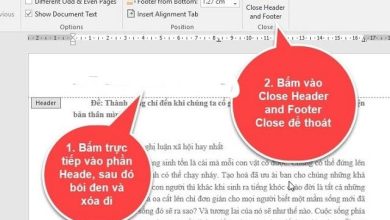Công thức câu bị đông trong tiếng anh và bài tập có đáp án chuẩn nhất

Khái niệm, cấu trúc, cách sử dụng, quy tắc thay đổi câu chủ động sang thụ động, các dạng câu thụ động đặc biệt và bài tập có giải đáp đầy đủ và chuẩn xác nhất. Xem cụ thể tại đây.
Câu thụ động (Passive Voice) là phần ngữ pháp tương đối trọng yếu và phức tạp trong tri thức thi Đại học tiếng Anh nếu. Tuy nhiên, một khi đã nắm rõ quy tắc trong mảng ngữ pháp này thì việc chuyển hóa từ câu chủ động sang câu thụ động sẽ trở nên vô cùng đơn giản. Vì thế, hãy cùng bắt tay vào học các cấu trúc câu passive voice nào.
Table of Contents
Cấu trúc câu thụ động trong tiếng anh
- Active: S + V + O + …….
- → Passive: S + be + PP2 + by + O + ……
Ex: Active: She arranges the books on the shelf every weekend. Passive: The books are arranged on the shelf by her every weekend. Điều kiện để có thể thay đổi 1 câu từ chủ động thành thụ động:
- V trong câu chủ động phải là Transitive Verb (Ngoại động từ: đòi hỏi có O theo sau)
- Các O (trực tiếp, gián tiếp) phải được nêu rõ ràng
Quy tắc thay đổi câu chủ động sang câu thụ động
- Khi thay đổi 1 câu từ chủ động sang thụ động ta làm theo các bước sau:
- Xác nhận S, V, O và thì của V trong câu chủ động.
- Lấy O trong câu chủ động làm S của câu thụ động.
- Lấy S trong câu chủ động làm O và đặt sau By trong câu thụ động.
- Biến dổi V chính trong câu chủ động thành PP2 (Past Participle) trong câu thụ động.
- Thêm To be vào trước PP2 trong câu thụ động (To be phải chia theo thời của V chính trong câu chủ động và chia theo số của S trong câu thụ động).
Những điều cần lưu ý khi chuyển câu chủ động sang câu thụ động
- Trong câu thụ động by + O luôn xếp sau adverbs of place (trạng từ chỉ nơi chốn) và đứng trước adverbs of time (trạng từ chỉ thời gian).
- Trong câu thụ động, có thể bỏ: by people, by us, by them, by someone, by him, by her…nếu chỉ đối tượng không xác nhận.
- Nếu O trong câu thụ động là sự vật, sự việcthì dùng with thay cho by.
Ex: The bird was shot with the gun. → The bird was shot by the hunter.
là phần ngữ pháp tương đối trọng yếu và phức tạp trong tri thức thi Đại học tiếng Anh nếu. Tuy nhiên, một khi đã nắm rõ quy tắc trong mảng ngữ pháp này thì việc chuyển hóa từ câu chủ động sang câu thụ động sẽ trở nên vô cùng đơn giản. Vì thế, hãy cùng bắt tay vào học các cấu trúc câu passive voice nào.Ex: Active: She arranges the books on the shelf every weekend. Passive: The books are arranged on the shelf by her every weekend.Ex: The bird was shot with the gun. → The bird was shot by the hunter.

Công thức câu thụ động ở các thì trong tiếng anh
Tenses
Active
Passive
Simple Present
S + V + O
S + be + PP.2 + by + O
Present Continuous
S + am/is/are + V-ing + O
S + am/is/are + being + PP.2 + by + O
Present Perfect
S + has/have + PP.2 + O
S + has/have + been + PP.2 + by + O
Simple Past
S + V-ed + O
S + was/were + PP.2 + by + O
Past Continuous
S + was/were + V-ing + O
S + was/were + being + PP.2 + by + O
Past Perfect
S + had + PP.2 + O
S + had + been + PP.2 + by + O
Simple Future
S + will/shall + V + O
S + will + be + PP.2 + by + O
Future Perfect
S + will/shall + have + PP.2 + O
S + will + have + been + PP.2 + by + O
Be + going to
S + am/is/are + going to + V + O
S + am/is/are + going to + be + PP.2 + by + O
Model Verbs
S + model verb + V + O
S + model verb + be + PP.2 + by + O
Câu chủ động có 2 tân ngữ – So với câu chủ động có 2 tân ngữ (trong đó thường có 1 tân ngữ chỉ người và 1 tân ngữ chỉ vật) như give, show, tell, ask, teach, send …… muốn nhấn mạnh vào tân ngữ nào người ta mang tân ngữ đó lên quản lý ngữ của câu thụ động. Do đó, ta có thể viết được 2 câu thụ động bằng cách lần lượt lấy O1 và O2 của câu chủ động ban đầu quản lý ngữ để mở màn các câu thụ động.
Ex: I gave him a book. → He was given a book (by me) Or A book was given to him (by me).
Động từ trong câu chủ động có giới từ đi kèm – Tất cả chúng ta không thể tách giới từ khỏi V mà nó đi cùng. Ta đặt giới từ đó ngay sau V trong câu thụ động.
Ex: – Someone broke into our house . → Our house was broken into.
Cách sử dụng một số dạng
câu thụ động đặc biệt
Chuyển câu chủ động có sử dụng to-V thành thụ động:
– The boys usually picks her up. → She is usually picked up by the boys.
S + V + Sb + to-V + O
Mẫu A: S + V + to be + PP.2 + (by Sb)
Mẫu A: S + V + to be + PP.2 + (by Sb)
Mẫu B: S + V + O + to be + PP.2 + (by Sb)
Mẫu C: Sb + be + PP.2 + to-V + O
* Cách 1: Nếu tân ngữ sau to-V trong câu chủ động cũng chính là chủ ngữ trong câu thụ động à dùng mẫu A
Ex: I want you to teach me → I want to be taught by you.
* Cách 2: Nếu tân ngữ sau to-V trong câu chủ động khác với chủ ngữ trong câu thụ động à dùng mẫu B
Ex: I want him to repair my car → I want my car to be repaired by him
* Cách 3: Có thể dùng Sb trong câu chủ động làm Chủ ngữ của câu thụ động à dùng mẫu C
Ex: People don’t expect the police to find out the stolen car. → The police aren’t expected to find out the stolen car.
S + V1 + V-ing + O + … → S + V + (that) + O + should be + P.P2 + …
Ex: She suggests drinking beer at the party. → She suggests that beer should be drunk at the party.
S + V1 + Sb + V-ing + O… → S + V + being + P.P2 + …
Ex: She remember people taking her to the zoo. → She remember being taken to the zoo.
* Trong mẫu câu 2 và 3, V1 là những V đòi hỏi được theo sau bởi V-ing
Chuyển câu chủ động dùng Bare-Infinitive (Động từ nguyên thể không có To) sau các V chỉ giác quan thành câu thụ động :
S + see / hear / watch / look /catch … + Sb + V + O …. → Sb + be + seen / heard / watched / looked / caught … + to-V + O ….
* Cách chuyển: Đổi V thành to-V khi chuyển sang thụ động:
Ex: I sometimes see him go out. → He is sometimes seen to go out.
Chuyển câu chủ động có V-ing sau các V chỉ giác quan sang thụ động: S + see / hear / watch / look / catch … + Sb + V-ing + O …. → Sb + be + seen / heard / watched / looked / caught/ …+ V-ing + O …
* Cách chuyển: Khi chuyển sang thụ động, V-ing vẫn giữ nguyên là V-ing
Ex: I see him bathing her dog now. → He is seen bathing her dog now. We heard her singing loudly . → She was heard singing loudly.
Chuyển câu mệnh lệnh chủ động à thụ động: Dùng LET Nhất định: V + O Let + O + be + P.P2 Phủ định: Don’t + V + O Don’t let + O + be + P.P2
Ex: Do the exercise! → Let the exercise be done! Don’t leave him alone! → Don’t let him be left alone!
* Câu mệnh lệnh chủ động cũng có thể chuyển thành thụ động với SHOULD trong một số tình huống:
Ex: Don’t use the car in case it breaks down. → The car shouldn’t be used in case it break down.
Don’t let + Sb + V + you → Don’t let + yourself + be + P.P2
Ex: Don’t let the others see you. à Don’t let yourself be seen.
It + be + adj + to-V + O … → It + be + adj + for O + to be + P.P2 …
Ex: It’s very difficult to study English. à It’s very difficult for English to be studied.
It + be + my/your/her/his/our/their… + duty + to-V + (O) → I/You/She/He/We/They + be + supposed + to-V + (O) Ex: It’s their duty to do this job. → They are supposed to do this job.
Mẫu câu với have/get: * S + have + Sb + V + O … → S + have + O + PP.2 + (by+ Sb)
Ex: I had him repair my bike. → I had my bike repaired by him. * S + get + Sb + to-V + O … → S + get + O + to be + PP.2 (by + Sb)
Ex: We get him to look after our house when we are on business. → We get our house to be looked after (by him) when we are on business.
S + make / let / help … + Sb + V + O … → Sb + be + made / helped + to-V + O …
Ex: She made me work hard. → I was made to work hard.
* Note: Mẫu câu chủ động với “to let” khi chuyển sang thụ động nên được thay thế bằng dạng thụ động của ALLOW + to-V: S + let + O + V + (O) → Sb + be + allowed + to V + O.
Ex: She let him enter the room. → He was allowed to enter the room.
Sb + need / deserve … + to-V + Sth + … → Sth + need / deserve … + V-ing + …
Ex: We need to water the plants everyday. → The plants need watering everyday.
Câu thụ động có động từ tường thuật – Chủ động: S1 + V1 + that + S2 + V2 + O + …..
* Những động từ tường thuật (Reporting Verbs = V1) thường gặp: think consider know believe say suppose suspect rumour declare ……………… ………… ………… ………… ………… ……………
* So với loại câu này, S thường là People/They …và thường được dịch là “Người ta ….”
Có thể thay đổi câu chủ động này theo các trường hợp sau:
V1 ở Hiện Tại Đơn – V2 sau That cũng ở Hiện Tại Đơn
Active
S1 + V1-s/es + that + S2 + V-s/es + O + ….
Passive
It is + PP2 của V1 + that + S2 + V-s/es + O + ….
S2 + am/is/are + PP2 của V1 + to + V + …..
Ex: People say that he always drink a lot of wine. → It is said that he always drink a lot of wine. Or: He is said to always drink a lot of wine.
V1 ở Hiện Tại Đơn – V2 sau That ở Quá Khứ Đơn
Active
S1 + V1-s/es + that + S2 + V-ed + O + ….
Passive
It is + PP.2 của V1 + that + S2 + V-ed + O + …..
S2 + am/is/are + PP.2 của V1 + to + have + PP.2 của V-ed + O + ….
Ex: Villagers think that he broke into her house. → It is thought that he broke into her house. Or: He is thought to have broken into her house.
V1 ở Quá Khứ Đơn – V2 sau That cũng ở Quá Khứ Đơn
Active
S1 + V1-ed + that + S2 + V-ed + O + ….
Passive
It was + PP.2 của V1 + that + S2 + V-ed + O + …..
S2 + was/were + PP.2 của V1 + to + V + O + ….
Ex: The police believed that the murderer died. → It was believed that the murderer died. Or: The murderer was believed to die. * Ngoài ra, còn có thể gặp một số trường hợp khác của mẫu câu này:
V1 ở Hiện Tại Đơn – V2 sau That ở Hiện Tại Tiếp Diễn
Active
S1 + V1-s/es + that + S2 + am/is/are + V-ing + O + ….
Passive
It is + PP.2 của V1+ that + S2 + am/is/are + V-ing + O + …..
S2 + am/is/are + PP2 của V1 + to + be + V-ing + O + ….
Ex: They think that she is living in London → It is thought that she is living in London. Or: She is thought to be living in London.
V1 ở Hiện Tại Đơn – V2 sau That ở Quá Khứ Tiếp Diễn
Active
S1 + V1-s/es + that + S2 + was/were + V-ing + O + ….
Passive
It is + PP2 của Reporting Verb + that + S2 + was/were + V-ing + O + …..
S2 + am/is/are + PP2 of Reporting Verb + to + have + been + V-ing + O + ….
Ex: We think that they were doing homework. → It is thought that they were doing homework. Or: They are thought to have been doing homework.
* Note: – Nếu V ở mệnh đề trước và sau “THAT” trong câu chủ động được chia cùng thời thì khi chuyển sang thụ động, ta dùng “to-V”
Ex: They rumored that the man killed his wife. → The man is rumored to kill his wife.
– Nếu V ở mệnh đề trước và sau “THAT” trong câu chủ động được chia ở 2 thời khác nhau, khi chuyển thành thụ động, ta dung “to + have + PP.2”
Ex: They rumor that the man killed his wife. → The man is rumored to have killed his wife.
Bài tập câu thụ động có giải đáp
Câu 1. Chuyển các câu sau sang thụ động
1.My father waters this flower every morning.
2.John invited Fiona to his birthday party last night.
3.Her mother is preparing the dinner in the kitchen.
4.We should clean our teeth twice a day.
5.Our teachers have explained the English grammar.
6.Some drunk drivers caused the accident in this city.
7.Tom will visit his parents next month.
8.The manager didn’t phone the secretary this morning.
9.Did Mary this beautiful dress?
10.I won’t hang these old pictures in the living room.
11.The German didn’t build this factory during the Second World War.
12.The Greens are going to paint this house and these cars for Christmas Day.
13.Ann had fed the cats before she went to the cinema.
14.The students have discussed the pollution problems since last week.
15.Have the thieves stolen the most valuable painting in the national museum?
16.Some people will interview the new president on TV.
17.How many languages do they speak in Canada?
18.Are you going to repair those shoes?
19.He has broken his nose in a football match.
20.Have you finished the above sentences?
Câu 2,
1. The waiter brings me this dish.
2. Our friends send these postcards to us.
3.Their grandmother told them this story when they visited her last week.
4.Tim ordered this train ticket for his mother.
5.You didn’t show me the special cameras.
6.She showed her ticket to the airline agent.
7.He lends his friend his new shoes.
8.She left her relatives five million pounds.
9.The shop assistant handed these boxes to the customer.
10.The board awarded the first prize to the reporter.
11.Have you sent the Christmas cards to your family?
12.The committee appointed Alice secretary for the meeting.
13.He hides the broken cup in the drawer.
14.They keep this room tidy all the time.
15.They all voted the party a great success.
16.We gave Ann some bananas and some flowers.
17.They moved the fridge into the living room.
18.She bought some cups of tea to the visitors in the next room.
19.They find the new project worthless.
20.The secretary didn’t take the note to the manager.
Câu 3.
1.They told me that you were the best architect in this city.
2.She reported that the flowers were killed by frost.
3.Some people inform me that the director is going to take a business trip to England.
4.That officer announced that the meeting was delayed until next week.
5.He discovered that this cotton was grown in Egypt.
6.They promise that the performance will start on time.
7.He recommends that we should stay at the city center.
8.We believed that Alice would pass the driving test.
9.The director notifies all the workers that they will have to work extra hard this month.
10.They have persuaded me that they will go with me to the stadium.
11.They have decided that the company will go to the beach together at the weekend.
12.People think that Maradona is the best football player in the 20th century.
13. They find that the job is not suitable for a girl like her.
14. The teacher explained that this powerful engine pulled the train.
15.He told me that his football team had played well last season.
Câu 4.
1.I had my nephew paint the gate last week.
2.She will have Peter wash her car tomorrow.
3.They have her tell the story again.
4.John gets his sister to clean his shirt.
5.Anne had had a friend type her composition.
6.Rick will have a barber cut his hair.
7.I will get the dressmaker to make a new dress.
8.He had a mechanic repair his car.
9.She often gets the technician to maintain the heater.
10.They had the police arrest the shoplifter.
11.Are you going to have the shoemaker repair your shoes?
12.I must have the dentist test my teeth.
13.She will have a veterinary surgeon examine her dog.
14.We had a man take this photograph when we were on holiday last summer.
15.The Greens had a carpet cleaner clean their carpet.
Giải đáp bài tập câu thụ động trong tiếng anh
Câu 1.
1.This flower is watered (by my father) every morning.
2.Fiona was invented to John’s birthday party last month.
3.The dinner is being prepared (by her mother) in the kitchen.
4.Our teeth should be cleaned twice a day.
5.The English grammar has been explained (by our teacher).
6.The accident was caused in this city (by some drunk drivers).
7.Tom’s parents will be visited (by him) next month.
8.The secretary wasn’t phoned (by the manager) this morning.
9.Was this beautiful dress bought by Mary?
10.These old pictures won’t be hung in the living room(by me).
11.This factory wasn’t built (by the Greens) during the Second World War.
12.This house and these cars are going to be painted for Christmas day by the Greens.
13.The cats had been fed (by Ann) before she went to the cinema.
14.The pollution problems have been discussed (by the students) since last week.
15.Has the most valuable painting in the national museum been stolen (by the thieves).
16.The new president will be interviewed on TV (by some people).
17.How many languages are spoken in Canada(by them)?
18.Are those shoes going to be repaired ?
19.His nose has been broken in a football match(by him).
20.Have above sentences been finished ?
Câu 2.
1.This dish is brought to me (by the waiter).
2.These postcards are sent to us(by our friend).
3.This story was told to them(by their grandmother) when they visited her last week.
4.This train ticket was ordered for Tim’s mother.
5. The special cameras weren’t showed to me.
6. Her ticket was showed to the airline agent(by her).
7.His new shoes are lent to his friends(by him).
8.Five million pounds was left to her relatives (by her).
9.These boxes were handed to the customer (by the shop assistant).
10.The first prize was awarded to the reporter (by the board).
11.Have the Christmas cards been sent to your family?
12.Alice was appointed secretary for the meeting(by the committee).
13.The broken cup is hidden in the drawer (by him).
14.This room is kept tidy (by them) all the time.
15.The party was voted a great success(by them).
16.Ann was given some bananas and some flowers(by us).
17.The fridge was moved into the living room(by them).
18.Some cups of tea were brought to the visitors in the next room (by her).
19.The new project is found worthless.
20.The note wasn’t taken to the manager(by the secretary).
Câu 3.
1.I was told that you were the architect in this city.
2.It was reported that the flowers were killed by frost./ The flowers were reported to be killed by frost.
3.I am informed that the director is going to take a business trip to England.
4.4.It was announced that the meeting was delayed until next week.
5.It was discovered that this cotton was grown in Egypt.
6.It is promised that the performance will start on time.
7.It is recommended that we should stay at the city center.
8.It was believed that Alice would pass the driving test./ Alice was believed to pass the driving test.
9.All the workers are notified that they will have to work extra hard this month.
10.I have been persuaded that they will go with me to the stadium.
11.It has been decided that the company will go to the beach together at the weekend.
12.It is thought that Maradona is the best football player in the 20th century./ Maradona is thought to be the best football player in the 20th century.
13.It is found that the job is not suitable for a girl like her./ The job is found to be not suitable for a girl like her. 14.It was explained that this powerful engine pulled the train.
15.I was told that his football team had played well last season.
Câu 4.
1.I had the gate painted last week.
2.She will have her car washed tomorrow.
3.They have the story told again.
4.John gets his shirt cleaned.
5.Anne has had her composition typed.
6.Rick will have his hair cut.
7.I will get a new dress made.
8.He had his car repaired.
9.She often gets the heater maintained.
10.They had the shoplifter arrested.
11.Are you going to have your shoes repaired?
12.I must have my teeth checked.
13.She will have her dog examined.
14.We had this photograph taken when we were on holiday last summer.
15.The Greens had their carpet cleaned.
Tu khoa:
- công thức câu bị đông trong tiếng anh lop 8
- bài tập câu bị đông trong tiếng anh
- cấu trúc câu bị đông
- câu bị đông đặc biệt
- câu bị đông là gì
- bài tập câu bị đông trong tiếng anh có giải đáp




